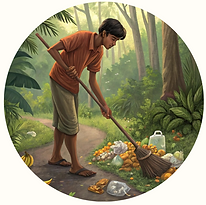
CHAGAS DISEASE
DAWE ARW O´

WHAT IS IT?
Chagas disease is caused by the Trypanosoma parasite, which is transmitted by a triatomine or bed bug insect, also known locally as a 'chinche' or 'pito'.
TAKÜ NII?
Ñá o´ wii o´rí parásito trypanosomawá üü, náega náichiwe.
HOW IS IT TRANSMITTED?
There are three modes of transmission: through bites, oral transmission, and fetal transmission.
-
Bite: The bed bug becomes infected with the parasite when it takes blood from an infected individual. It then bites another person and defecates around the wound. The bite causes itching, and scratching facilitates the parasite's entry into the body. Because they tend to bite people's faces, these insects are also known as "kissing bugs." These bugs gather in shelters during the day and emerge in search of blood at night.
-
Oral transmission: The person consumes food or uses utensils covered with bed bug feces.
-
Fetal transmission: The mother can transmit infection to her baby during pregnancy.
ÑUAKÜ I DAWE?
Na ñe´má tamae´pü, ñúakü i dawe:
-
Paigü: Ñá naichiwe ni dawe yimá nagümaa nge´tá a duukü. Ñẽmana´kü wiie duee tw na pai achí nagu na woé tw na painwa. Tw na painwa ni chá rw ñe´guma a wügú tagu na úcu ñema parásito. Dueechametüca na daun urw tagu narw wa, rw ñema nii tw na pai, ña “naichiwe besucones”. Ña naichiwegü ngunekü nügü na nutakee ina pegünwá achí chütakügurika ni choun nagüca na daugü.
-
Oral: Yi´má duẽẽ ta chibügú urw cu´chiwa na e´gu naichiweüngü.
-
Naün: Yi´ma mamá (oé) ta tapütüwegu ngürüachi tümaarü õó tümaanügu ti dawe.
~
WHAT ARE THE SYMPTOMS?
In some cases, the person may not present any symptoms. After 4-12 days, a bite-infected person may develop a hardened lesion around the bite, resembling an infected pimple. If the infection occurred through contaminated food, the person may have difficulty swallowing, chronic constipation, and facial swelling.




Fever
aüne
Headache
nguéru
Muscle pain
turamachi
Stomachache
nguáchineca
NGEÜRÜN NII NO´RÜ CHIEAE?
Tá yi´má duẽẽgü tama náwá i dawee. Ñu´guakü marü tw na paigu náchicawa ni taipün, nawena agümükü rw gumepu rw taré nguneün (narw o´rirawn). Yi´má duee ti aüne, ngueru, nguune, ngu´neca. Ñu´guakü ónawa ti dawe, a duẽẽ tauküra óna i ta ga, ngu´necaichi rw ta rw chachametü.
WHAT ARE THE WARNING SIGNS?
You should go to the hospital quickly if you have a fever lasting more than 7 days, enlarged lymph nodes, difficulty breathing, or abdominal pain. You should also go if you experience chest pain, difficulty breathing, dizziness, or fainting from eating contaminated food. Failure to go to the hospital early can cause inflammation of the heart, enlargement of the esophagus or colon, and lead to death.
NGEÜRÜN NII NO´RÜ DAWEAE?
Na´weenii paama hospitalwá cu ú ki aüneichigu wiimepu rw ta´ré nguneüngu, ganglios linfáticos ni tagü, taukürá ti ngüaküü rw cu ngu´ca. Na´weenii ngürüachi ta ngu´remügu, taukürá ki ngüaküügu, cu ãuwae urw ki yuachi óna chieuwa. Tama paama yigü i üüngu ní pu to´rw maune, ta´manaa ni ta rw ta nguün echaküran achí yuwa ta ú.
HOW CAN WE PREVENT THIS DISEASE?
Bed bugs [pitos or chinches] live in holes in walls, under beds and mattresses, behind wall decorations, in places where animals sleep, in corral fences, in firewood piles or piles of objects, and in the seeds of fruits such as asai.



Clean the front garden - 'solar' frequently and avoid accumulating trash or wood.
Check the bed, walls or places in the house where the penis can hide.
Spray and wash the fruits well, especially the asai, before preparing it.
ÑUAKÜ TAMA TA TÜ´NA NA NGUÜN ÑEMA NGUANE?
Ñema naichiwegü na´tapümaüngüwa nii na maegün, camatatünwa rw colchongüwa, adornostatünwa, naengü i pegünwá, üütanuwá urw airunwá, nutatünwá achí wairapüügüwá.
Ñemacanii paama i ngíatü achí tautama üaün nge´ta na nugün, cámana cu daú, na´wenii tachinna i dãũn ngürüanchi na ñémá naichiwegü, meamatá nii na yauun guunma i o´rigü, ñe´gumarün a waira na u´gú.